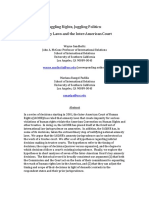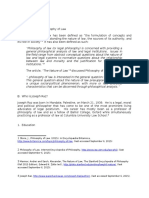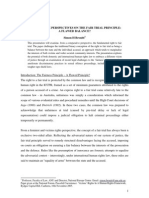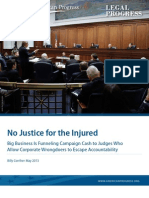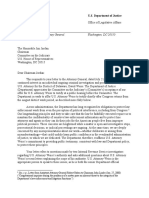Mandatory Minimum 1AC
Mandatory Minimum 1AC
Uploaded by
davidsheaffer12Copyright:
Available Formats
Mandatory Minimum 1AC
Mandatory Minimum 1AC
Uploaded by
davidsheaffer12Copyright
Available Formats
Share this document
Did you find this document useful?
Is this content inappropriate?
Copyright:
Available Formats
Mandatory Minimum 1AC
Mandatory Minimum 1AC
Uploaded by
davidsheaffer12Copyright:
Available Formats
Affirmative -Mandatory Minimum
Sheaffer/Wright Region IX
Affirmative Abolish Mandatory Minimum Statutes
In 1986 the American publics rising concern over drug addictions pressured congress into passing a law that established strict and mandatory penalties for all drug offenders. The law then expanded to mandatory sentances for a variety of crimes. These laws were passed without any hearings, debate, or study. Michael Tonry, a senior fellow for the Institute for the Study of Crime and Law Enforcement noted that: The policy and human rights implications of this two-century-old body of knowledge are clear. Mandatory penalties are a bad idea. They often result in injustice to individual offenders. They undermine the legitimacy of the courts and the prosecution system by fostering circumventions that are willful and subterranean. They undermine achievement of equality before the law when they cause comparably culpable offenders to be treated radically differently when one benefits from practitioners' circumventions and another receives a mandated penalty that everyone immediately involved considers too severe. And the clear weight of the evidence is, and for nearly 40 years has been, that there is insufficient credible evidence to conclude that mandatory penalties have significant deterrent effects.
Michael Tonry [Professor of law and public policy, University of Minnesota Law School; Senior fellow, Netherlands Institute for the Study of Crime and Law Enforcement], The Mostly Unintended Effects of Mandatory Penalties: Two Centuries of Consistent Findings, The University of Chicago Crime and Justice, 2009, 38 Crime & Just. 65 [Ethos]
Its for these very reasons that my partner and I stand resolved: That the United States Federal Government should significantly reform its criminal justice system. Now lets move on to Definitions. All sources available upon the negative teams request. Manditory Minimums: Mandatory minimums, As defined by the Cardoza Law Review in 2010, Enacted by statute, mandatory minimums set the lower limits for sentencing particular offenses and particular offenders. If a defendant is convicted of a given crime or has a certain criminal history typically measured by objective criteria (e.g., the quantity of drugs possessed or the number of prior felony convictions) - then he must be sentenced to at least the legislatively prescribed prison term. Erik Luna [Professor of Law and Law Alumni Faculty Fellow, Washington and Lee University School of Law] and Paul G. Cassell [Ronald N. Boyce Presidential Professor of Criminal Law, University of Utah S.J. Quinney College of Law], Mandatory Minimalism, Cardozo Law Review, September 2010, 32 Cardozo L. Rev. 1 [Ethos]
In other words, a mandatory minimum statute is a law that requires a judge to levy certain sentences for certain types of crimes. While at face value, these policies seem sensible, but their implementation in our criminal justice system has been little short of a colossal failure. As former Chief Justice William Rehnquist put it, Mandatory minimum sentences are perhaps a good example of the law of unintended consequences.
1|Page
Affirmative -Mandatory Minimum
Sheaffer/Wright Region IX
Because mandatory minimum statutes result in these consequenses, we propose the following PLAN to be enacted by any constitutional means: Mandate 1: Mandatory Minimum Reform. Congress will declare all federal mandatory minimum statutes to be void, and thus release federal judges from legal obligations to adhere to mandatory minimum statutes. Mandate 2: Alternatives. Given the state of our current incarceration rates, Congress will pass a resolution stating that alternative sentencing is to be a priority for those with little or no criminal record that fall into Zones A-C in the federal sentencing guidelines. Now that lets look more in depth at the reasons why an Affirmative ballot is justified in.
Justifications:
-Our first justification is the Pursuit of Effective Policy. First we need to see how the current system is far from an effective policy. In theary, one may conclude that mandatory strict punishments would be sucessful in deterring criminals. However in practice, this is simply not true. This is seen in our first point: Deterrence. Marc Mauer, the executive director of The Sentencing Project, and one of the countrys leading experts in the criminal justice system said in August 2010:
Marc Mauer, Executive Director of the Sentencing Project, (One of the countrys leading experts in the criminal justice system) August 2010. He has directed programs on criminal justice policy reform for 30 years, and is the author of some of the most widely-cited reports and publications in the field. He has testified before Congress and state legislatures, frequently appears on radio and television networks, and is regularly interviewed by the New York Times, Washington Post, National Public Radio, and many other major media outlets. He has served as an adjunct faculty member at George Washington University and Payne Theological Seminary, as well as a consultant to the Bureau of Justice Assistance, the National Institute of Justice, and the American Bar Associations Committee on Race and the Criminal Justice System. Viewpoint. http://sentencingproject.org/doc/publications/s_Viewpoint.pdf
Looking at the experience of the past several decades, some observers have contended that mandatory minimums, including such federal penalties, have produced significant benefits in reducing crime. At a 2009 congressional hearing, for example, former U.S. Attorney Michael J. Sullivan asked, Has the
role that Congress played in sentencing, including the passage of mandatory minimum sentences, had an impact on public safety and crime? He concluded that The answer to that question can easily be found in crime statistics and is buttressed by anecdotal story after story from across our nation. Crime rates over the past 30 years certainly paint a picture of continuing success of reducing crime and victimization through sound public policy. What, then, do we know about the extent to which federal mandatory penalties have been responsible for declines in crime?
To date, there is virtually no data that is capable of demonstrating a direct link between federal mandatory penalties in particular and any declines in crime. Further, a broad range of research suggests that it is quite unlikely that these penalties would have such an impact. Because of the failure of this policy, we see that we are needlesly locking up criminals left and right without deterring them. This results in our first impact: Overcrowding. In mid 2011, The Smart on Crime (a letter of recommendations to congress consisting of over 100 expert opinions)
2|Page
Affirmative -Mandatory Minimum
Sheaffer/Wright Region IX
noted that:
The Smart on Crime Recommendations for Congress. Put together by over 100 experts in the Criminal Justice System. 2011 Chapter 9: Federal Sentencinghttp://www.besmartoncrime.org/pdf/Chapter_09.pdf
For the first time in our nations history, more than one in 100 adults are imprisoned. The United States now imprisons its citizens at a rate roughly five to eight times higher than the countries of Western Europe, and twelve times higher than Japan. Approximately one-quarter of all persons imprisoned in the entire world are imprisoned in the United States. The federal sentencing scheme has contributed to these statistics. In the past 25 years since the advent of the Sentencing Guidelines and the mandatory minimum sentences for drug offenses, the average federal sentence has roughly tripled in length. This mass incarceration rate, due mostly to mandatory sentencing, results in our second impact: Inefficient use of money and law enforcement resources In 2009, the Connecticut Public Interest Law Journal confirmed that:
Brian J. Foley [J.D., Associate Editor, California Law Review; Visiting Associate Professor of Law, Boston University School of Law; clerked for Judge Edmund Ludwig of the U.S. District Court for the Eastern District of Pennsylvania], The Mass Incarceration Crisis as an Opportunity to Rethink Blame, Connecticut Public Interest Law Journal, Fall/Winter 2009, 9 Conn. Pub. Intl. L.J. 1
Mandatory minimum sentences express a harsh attitude of zero tolerance for criminal behaviors. Guidelines that prohibit examination of "excuses," such as lack of guidance as a youth, drug addiction, mental distress and the like, express a similar attitude. But this expressiveness comes at a high cost: we lock ourselves into meting out foreordained, immutable sentences. Sometimes it is like cutting off our nose to spite our face, such as when we incarcerate someone who neither deserves nor needs to be incarcerated, requiring that we to pay for the imprisonment through our own taxes. Turning the tables, the previously quoted Smart on Crime shows that alternatives to incarceration solve for each of the problems created by mandatory minimums:
The Smart on Crime Recommendations for Congress. Put together by over 100 experts in the Criminal Justice System. 2011 Chapter 9: Federal Sentencing http://www.besmartoncrime.org/pdf/Chapter_09.pdf
While the high costs to society of incarceration might be tolerable were more effective and less expensive alternatives to reducing crime not available--but they are. Thirty years of academic research and real-world experience have demonstrated that incarceration is valuable for removing the most dangerous, violent individuals from our streets, but counterproductive to efforts to rehabilitate those who commit less serious offenses before they re-enter society. Community corrections, treatment and rehabilitation, and other alternatives to prison have proven to be far more effective at reducing recidivism rates and at less cost to taxpayers.
What we can conclude from this first justification is clear. The status quo has provided nothing but an ineffective and counter-productive policy. If we are to move to more responsibly policy making, we must abolish mandatory minimums and pursue alternatives.
3|Page
Affirmative -Mandatory Minimum
Sheaffer/Wright Region IX
-Our second justification for policy reform is The Pursuit of Justice. Since the implimentation of mandatory minimums, our federal judges have been put under restriction in many ways. Erik Luna, and Paul G. Cassel. Both professors of law, explained the first in September of 2010.
Erik Luna [Professor of Law and Law Alumni Faculty Fellow, Washington and Lee University School of Law] and Paul G. Cassell [Ronald N. Boyce Presidential Professor of Criminal Law, University of Utah S.J. Quinney College of Law], Mandatory Minimalism, Cardozo Law Review, September 2010, 32 Cardozo L. Rev. 1 [Ethos] Lengthy mandatory prison sentences in the federal system are under heavy fire. The basic critique of these "mandatory minimums" is well known and becoming more widely accepted : A mandatory minimum deprives judges of
the flexibility to tailor punishment to the particular facts of the case and can result in an unduly harsh sentence. In the past, it was perhaps unsurprising to find federal judges - including Justices Stephen Breyer and Anthony Kennedy, and the late Chief Justice William Rehnquist - voicing dismay at the excessive sentences they were required to pronounce and affirm. But the most interesting, and potentially influential, response to mandatory minimums has come from the political branches. Now lets move to the impacts for this lack of flexibility: Impact 1: Without flexibility, judges are forced into handing down extremely irrational sentences: Kieran Riley from the Boston University Public Law Journal affirmed in the spring of 2010 that..
Trial by Legislature: Why Statutory Mandatory Minimum Sentences Violate the Separation of Powers Doctrine, The Trustees of Boston University, The Boston University Public Interest Law Journal, Spring 2010, 19 B.U. Pub. Int. L.J. 285 [Ethos]
There are many examples of cases in which federal judges have felt trapped by their necessity, under law, to impose mandatory minimum sentences. One recent case is United States v. Angelos. Weldon Angelos was convicted of selling eight-ounce bags of marijuana to an undercover police officer on three occasions. Unfortunately, he also was wearing a gun strapped to his ankle on those occasions. Angelos never threatened anyone with the gun, showed anyone the gun, or even removed the gun from his ankle. Nevertheless, his mere possession of the gun triggered a mandatory minimum sentence of fifty-five years in jail. Federal Judge Paul Cassel, who was forced to impose this sentence upon Mr. Angelos, conducted a comparison survey and noted that Angelos's fifty-five year prison term is a longer sentence than Angelos would have received if he had hijacked a plane, beaten someone to death in a fight, detonated a bomb in an aircraft, or provided weapons to support a foreign terrorist group. In fact, the maximum sentence for all
those crimes added together is less than the mandatory minimum under federal sentencing rules for a small-time dope dealer carrying a gun. Judge Cassell decried the statutory mandatory minimum, saying that the
sentence imposed was "unjust, cruel, and irrational." He expressed regret that he had no way out and had to follow the law as it was written. But Judge Cassell recommended that then-President George W.
Bush commute Mr. Angelos's sentence and urged Congress to modify the law.
4|Page
Affirmative -Mandatory Minimum
Sheaffer/Wright Region IX
Impact 2: Constitutionality. The Public Interest Law Journal said in 2010:
Kieren Riley, Public Interest Law Journal 2010 Trial by legislature: Why statutory mandatory minimum sentences violate the separation of powers doctrine http://www.bu.edu/law/central/jd/organizations/journals/pilj/vol19no2/documents/19-2RileyNote.pdf
Congress exceeds its constitutional authority when it passes criminal statutes that mandate minimum punishments. These statutes create a system of criminal punishment in the United States where the legislature and the prosecution control the future of citizens convicted of crimes. These laws deprive the judiciary of its basic constitutional function, which is weighing facts in each case to ensure a just outcome for each criminal defendant. This violates the constitutional doctrine of separation of powers. These laws persist despite lopsided results between the
crime and the punishment when applied across the board to each individual defendant. Statutory mandatory minimums should therefore be abolished.
Congress should listen to the growing number of American citizens opposed to statutory mandatory minimum sentences and repeal these laws. If Congress does not take this action, the Supreme Court and other federal courts should embrace their authority and declare these laws unconstitutional.
Given the status quo of perverted justice it is clear policy much be reformed. The repealing of mandatory minimum sentencing will grant our federal judges with the ability to adequetly pursue just sentences. In 2008 The Vera Institute of Justice observed that:
Molly M. Gill [Staff Attorney and Special Projects Director, FAMM (Families Against Mandatory Minimums), which works to change mandatory sentencing laws by educating the public and the U.S. Sentencing Commission], Correcting Course: Lessons from the 1970 Repeal of Mandatory Minimums, Vera Institute of Justice, Inc. Federal Sentencing Reporter 1053-9867, October 2008, 21 Fed. Sent. R. 55 [Ethos, brackets and ellipses in original]
Congressman John Glenn Beall, Jr. (R-Md.) argued that [f]ederal penalties for drug violations are inconsistent, illogical, and unduly severe in some cases. Repealing mandatory sentences would revamp the entire penalty scheme, substituting a new and flexible system of penalties which will enable courts to truly tailor the punishment in any given case to fit the crime. Current penalties have little or no deterrent value. Congressman David Satterfield (D-Va.) noted the extreme difficulty in attempting to dispense justice and in sentencing individuals who have been convicted of violations where a minimum penalty is required...[Repeal of minimum penalties] will afford our courts greater latitude to the end that greater justice will be served better. The renowned Greek playwright Sophocles is reported to have said, All men make mistakes, but a good man yields when he knows his course is wrong, and he repairs the evil. While well intentioned, federal mandatory minimum policies are beyond a doubt a blight to our criminal justice system. And while we cannot reverse the mistakes of the last several decades, we can acknowledge them and take the necessary steps to restoring judicial discretion and justice to our criminal justice system.
5|Page
Affirmative -Mandatory Minimum
Sheaffer/Wright Region IX
6|Page
You might also like
- Legislation and Regulation Outline - Spring 2017Document23 pagesLegislation and Regulation Outline - Spring 2017schyler cox100% (5)
- Con Law StepsDocument19 pagesCon Law StepsNorbert 1113100% (2)
- Johns Hopkins Responds To Questions About Gambling and AddictionDocument4 pagesJohns Hopkins Responds To Questions About Gambling and AddictionSteven DoyleNo ratings yet
- Basics of Bloodstain Pattern Analysis: December 2020Document9 pagesBasics of Bloodstain Pattern Analysis: December 2020Vaishnavi MurkuteNo ratings yet
- Synthesis Paper Revision 1Document7 pagesSynthesis Paper Revision 1api-564597486No ratings yet
- Annotated Bibliography On The Death PenaltyDocument4 pagesAnnotated Bibliography On The Death Penaltyapi-264392879No ratings yet
- Amnesty Laws and The Inter-American CourtDocument47 pagesAmnesty Laws and The Inter-American CourtDani McstNo ratings yet
- Australian Regulatory Response To Genome Edited Plants, Karinne LudlowDocument30 pagesAustralian Regulatory Response To Genome Edited Plants, Karinne LudlowJournal of Law, Information & ScienceNo ratings yet
- Belmont Report OriginalDocument10 pagesBelmont Report OriginalPompiliu BarbuNo ratings yet
- Driven To Safety 2017 OnlineDocument50 pagesDriven To Safety 2017 OnlineArmie Salcedo100% (1)
- PAYING FOR INFORMATION A Report of The Ethics Advisory Committee of The Canadian Association of JournalistsDocument4 pagesPAYING FOR INFORMATION A Report of The Ethics Advisory Committee of The Canadian Association of Journalistsjsource2007No ratings yet
- Evaluate The Impact of Montgomery V Lanarkshire (2015) UKSC 11 On The Law of Consent in The United Kingdom.Document10 pagesEvaluate The Impact of Montgomery V Lanarkshire (2015) UKSC 11 On The Law of Consent in The United Kingdom.Tom DohertyNo ratings yet
- Decision Making in Criminal Justice: Toward The Rational Exercise of DiscretionDocument16 pagesDecision Making in Criminal Justice: Toward The Rational Exercise of DiscretionSofia RoyalesNo ratings yet
- Class Outline Crim LawDocument27 pagesClass Outline Crim LawJayme SimpsonNo ratings yet
- Ethical Issues With Informed Consent (Escobedo, 2007) PDFDocument8 pagesEthical Issues With Informed Consent (Escobedo, 2007) PDFMuhammad YusarNo ratings yet
- Legal Positivism - IntroductionDocument4 pagesLegal Positivism - IntroductionNath AntonioNo ratings yet
- Assessing The Status of Professional Ethics Among Ghanaian RadiographersDocument31 pagesAssessing The Status of Professional Ethics Among Ghanaian Radiographersdeehans100% (2)
- Ang Nars Partylist vs. Executive Secretary (Summary)Document7 pagesAng Nars Partylist vs. Executive Secretary (Summary)Lawdemhar Cabatos50% (4)
- Macalintal Vs Comelec DigestDocument2 pagesMacalintal Vs Comelec DigestYeshua Tura50% (2)
- Mandatory Minimum SentencingDocument10 pagesMandatory Minimum Sentencingapi-302985199No ratings yet
- Crime and Justice, Volume 42: Crime and Justice in America: 1975-2025From EverandCrime and Justice, Volume 42: Crime and Justice in America: 1975-2025No ratings yet
- Steve Sady State Sovereignty and Federal Sentencing Why de Facto Consecutive Sentencing by The Bureau of Prisons Should Not Survive Bond V United StatesDocument7 pagesSteve Sady State Sovereignty and Federal Sentencing Why de Facto Consecutive Sentencing by The Bureau of Prisons Should Not Survive Bond V United Statesmary engNo ratings yet
- Thesis Draft: THE DAMAGE CAUSED BY MANDATORY SENTENCINGDocument55 pagesThesis Draft: THE DAMAGE CAUSED BY MANDATORY SENTENCINGAlma CurrierNo ratings yet
- New South Wales Rape Shield LawDocument7 pagesNew South Wales Rape Shield Lawmary engNo ratings yet
- Research Paper Criminal Justice SystemDocument5 pagesResearch Paper Criminal Justice Systemc9sj0n70100% (1)
- Healthcare Law and Ethics - AbidDocument10 pagesHealthcare Law and Ethics - AbidSimran LakhwaniNo ratings yet
- My Annotated Bibliography On The Death PenaltyDocument5 pagesMy Annotated Bibliography On The Death Penaltyapi-432082602No ratings yet
- Gross Negligence ManslaughterDocument53 pagesGross Negligence Manslaughterapi-24869020180% (5)
- No Justice For The InjuredDocument189 pagesNo Justice For The InjuredCenter for American Progress100% (1)
- Dissertation - EuthanasiaDocument62 pagesDissertation - EuthanasiaAnju Annie ThomasNo ratings yet
- Tort Claims For Bullying, Harassment and Stress at Work PDFDocument39 pagesTort Claims For Bullying, Harassment and Stress at Work PDFclaireNo ratings yet
- Guideline For Management of A Patient Undergoing HysterosDocument4 pagesGuideline For Management of A Patient Undergoing HysterospolygoneNo ratings yet
- Consent COMMON LAW Introducti OnDocument4 pagesConsent COMMON LAW Introducti OnNowell TannieNo ratings yet
- F. Bolúmar-Montero, M.J. Fuster-Ruiz de Apodaca, M. Weait, J. Alventosa & J. Del Amo (2015) Time trends, characteristics, and evidence of scientific advances within the legal complaints for alleged sexual HIV transmission in Spain: 1996–2012, AIDS Care: Psychological and Socio-medical Aspects of AIDS/HIV, 27:4, 529-535, DOI: 10.1080/09540121.2014.980213Document7 pagesF. Bolúmar-Montero, M.J. Fuster-Ruiz de Apodaca, M. Weait, J. Alventosa & J. Del Amo (2015) Time trends, characteristics, and evidence of scientific advances within the legal complaints for alleged sexual HIV transmission in Spain: 1996–2012, AIDS Care: Psychological and Socio-medical Aspects of AIDS/HIV, 27:4, 529-535, DOI: 10.1080/09540121.2014.980213HIV Justice Network100% (1)
- Evidence Based MedicineDocument20 pagesEvidence Based MedicinePrav Grewal100% (1)
- Research PaperDocument12 pagesResearch Paperapi-451581488No ratings yet
- CH04 PDFDocument27 pagesCH04 PDFMd. Arif Hassan100% (2)
- Leyes de La RobñoticaDocument7 pagesLeyes de La RobñoticaHectorMenendezNo ratings yet
- Indian Journal of Criminology 2018-19 PDFDocument142 pagesIndian Journal of Criminology 2018-19 PDFChintakayala SaikrishnaNo ratings yet
- Continuum Robots For Medical Applications: A SurveyDocument20 pagesContinuum Robots For Medical Applications: A SurveyErwin PerdanaNo ratings yet
- Telesurgery and Robotic Surgery Ethical and Legal Aspect 2376 0214 1000355 PDFDocument2 pagesTelesurgery and Robotic Surgery Ethical and Legal Aspect 2376 0214 1000355 PDFsilvanaNo ratings yet
- OSB 2017 FuturesTF SummaryDocument20 pagesOSB 2017 FuturesTF SummaryLaura OrrNo ratings yet
- Current Selected Legal and Ethical Issues of Regulation in The Field of RoboticsDocument8 pagesCurrent Selected Legal and Ethical Issues of Regulation in The Field of RoboticsNordsci ConferenceNo ratings yet
- Criminology, History Of: Camic, 1995 Laub and Sampson, 1991 Savelsberg Et Al., 2004 Short and Hughes, 2007Document6 pagesCriminology, History Of: Camic, 1995 Laub and Sampson, 1991 Savelsberg Et Al., 2004 Short and Hughes, 2007Ranjan Kumar SinghNo ratings yet
- DR Saiful's Notes On Medical & Allied Health Education - Statistics & Research MethodologyDocument117 pagesDR Saiful's Notes On Medical & Allied Health Education - Statistics & Research MethodologyNelmar Aranan100% (1)
- Case Study On Organ TransplantationDocument8 pagesCase Study On Organ TransplantationAndrea JoyaNo ratings yet
- The Massachusetts Sexually Dangerous Persons Statute: A Critique of The Unanimous Jury Verdict Requirement by Widmaier CharlesDocument17 pagesThe Massachusetts Sexually Dangerous Persons Statute: A Critique of The Unanimous Jury Verdict Requirement by Widmaier CharlesNew England Law ReviewNo ratings yet
- Kill Method A Provocation Jeff Ferrell PDFDocument22 pagesKill Method A Provocation Jeff Ferrell PDFBeth VianaNo ratings yet
- Official SWSSU Calls To ActionDocument2 pagesOfficial SWSSU Calls To ActionThe Daily Orange100% (1)
- 2008, Vol.92, Issues 5, Women's HealthDocument312 pages2008, Vol.92, Issues 5, Women's HealthHussain OudahNo ratings yet
- Administrative CriminologyDocument5 pagesAdministrative CriminologyFranklinBarrientosRamirezNo ratings yet
- Robotic Surgery: A Current PerspectiveDocument8 pagesRobotic Surgery: A Current PerspectivesilvanaNo ratings yet
- EMTALA Scenario Analysis - EditedDocument6 pagesEMTALA Scenario Analysis - EditedVictorNo ratings yet
- Ambulatory HysterosDocument8 pagesAmbulatory Hysteroskomlanihou_890233161100% (1)
- VectraOwnersManual Feb07Document428 pagesVectraOwnersManual Feb07salah subbahNo ratings yet
- 8.office Diagnosis and Management of Abnromal Uterine Bleeding - PublishedDocument16 pages8.office Diagnosis and Management of Abnromal Uterine Bleeding - PublishedRonald Ivan WijayaNo ratings yet
- Alternative Measures To PrisonDocument5 pagesAlternative Measures To PrisonMartaNo ratings yet
- Prostatitis AUA 2017Document29 pagesProstatitis AUA 2017Andres Felipe Cordoba AriasNo ratings yet
- Peters, Schrader RCCCA - One PagerDocument1 pagePeters, Schrader RCCCA - One PagerPeter SullivanNo ratings yet
- Final Exam Breakdown (120 Questions Total) :: Criminology (Legalistic, Cressey/Sutherland)Document36 pagesFinal Exam Breakdown (120 Questions Total) :: Criminology (Legalistic, Cressey/Sutherland)Reagan NediuNo ratings yet
- Lecture 1 Applied CriminologyDocument30 pagesLecture 1 Applied CriminologyMuhammad HasnainNo ratings yet
- The 100 Most Influential Publications in Paracetamol Poisoning TreatmentDocument81 pagesThe 100 Most Influential Publications in Paracetamol Poisoning TreatmentPetrov MihaelaNo ratings yet
- Crime Prevention Research PaperDocument6 pagesCrime Prevention Research Paperfvgh9ept100% (1)
- 7.12.17 Phillips Q2 Release-2Document2 pages7.12.17 Phillips Q2 Release-2jennifer_brooks3458No ratings yet
- Rights of PWDDocument6 pagesRights of PWDAnonymous B0hmWBTNo ratings yet
- United States v. Johnson, 383 U.S. 169 (1966)Document15 pagesUnited States v. Johnson, 383 U.S. 169 (1966)Scribd Government DocsNo ratings yet
- Starve The Beast - Origins and Development of A Budgetary MetaphorDocument22 pagesStarve The Beast - Origins and Development of A Budgetary MetaphorMrTwistNo ratings yet
- The Works of Thomas Jefferson, Vol. 4Document329 pagesThe Works of Thomas Jefferson, Vol. 4MLSBU11No ratings yet
- Military-Industrial Complex Speech, Dwight D. Eisenhower, 1961Document4 pagesMilitary-Industrial Complex Speech, Dwight D. Eisenhower, 1961Carl CordNo ratings yet
- Guide To First Principles - Tim SonnreichDocument18 pagesGuide To First Principles - Tim Sonnreichchandra_w809590No ratings yet
- Article ViiDocument12 pagesArticle ViiAaliyah AndreaNo ratings yet
- BOCEA v. Teves PDFDocument38 pagesBOCEA v. Teves PDFCarmela WenceslaoNo ratings yet
- G.R. No. L-23825 - Pelaez v. Auditor GeneralDocument18 pagesG.R. No. L-23825 - Pelaez v. Auditor GeneralJerwin DaveNo ratings yet
- Constitutional MandateDocument5 pagesConstitutional MandateZaira PangesfanNo ratings yet
- The XXVI BPW International Congerss ProceedingDocument123 pagesThe XXVI BPW International Congerss Proceedinganon_863652862No ratings yet
- Arnault Vs Nazareno DigestDocument3 pagesArnault Vs Nazareno DigestKar EnNo ratings yet
- Capriotti Complaint FiledDocument11 pagesCapriotti Complaint FiledTodd FeurerNo ratings yet
- 046 Pimentel v. Joint CommitteeDocument3 pages046 Pimentel v. Joint CommitteeCedric Dela CruzNo ratings yet
- Johnson v. Mayor and City Council of Baltimore, 472 U.S. 353 (1985)Document15 pagesJohnson v. Mayor and City Council of Baltimore, 472 U.S. 353 (1985)Scribd Government DocsNo ratings yet
- 2023.07.24 OUT Jordan Re David WeissDocument3 pages2023.07.24 OUT Jordan Re David WeissWashington ExaminerNo ratings yet
- Gec 2 Long Test & Final Exam ReviewerDocument15 pagesGec 2 Long Test & Final Exam ReviewerHannah Brynne UrreraNo ratings yet
- Adminstrative Law - Smart Notes PDFDocument92 pagesAdminstrative Law - Smart Notes PDFNaksh SansonNo ratings yet
- Social ScienceDocument219 pagesSocial Sciencedennis balbuenaNo ratings yet
- In Re in Re: en BancDocument23 pagesIn Re in Re: en BancLex AcadsNo ratings yet
- Province of Batangas v. RomuloDocument2 pagesProvince of Batangas v. RomuloGabriel AdoraNo ratings yet
- Alejo Mabanag Vs Jose Lopez VitoDocument12 pagesAlejo Mabanag Vs Jose Lopez VitoNoeme Barcelona PilatanNo ratings yet
- Statcon Digest Module 3Document21 pagesStatcon Digest Module 3Rachell Ann UsonNo ratings yet
- 43 - in The Matter of Charges of Plagiarism Against Assoc. Justice Mariano C. Del Castillo - PeraltaDocument6 pages43 - in The Matter of Charges of Plagiarism Against Assoc. Justice Mariano C. Del Castillo - PeraltaJames LouNo ratings yet
- Municipality of PilillaDocument23 pagesMunicipality of PilillaJosie Jones BercesNo ratings yet






